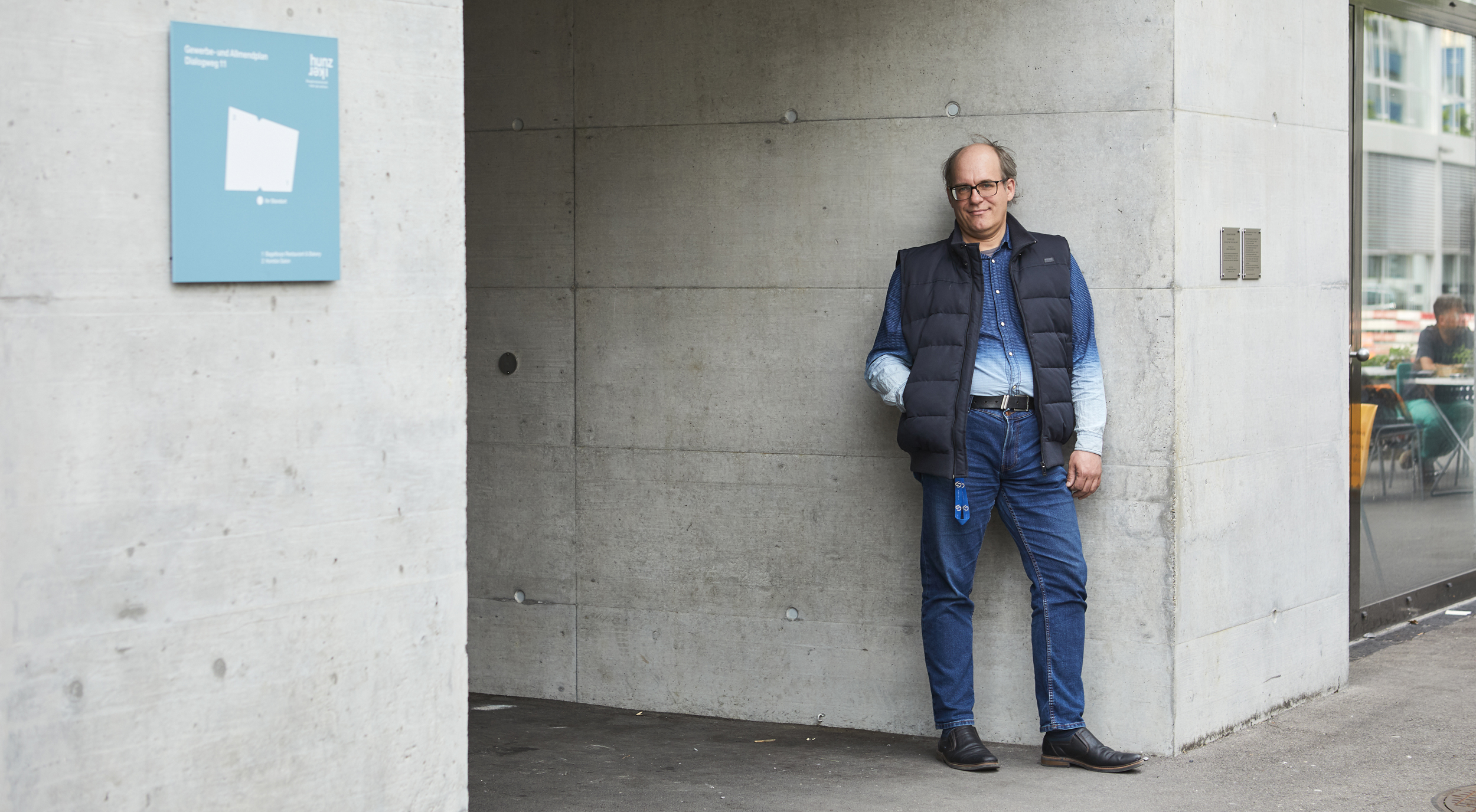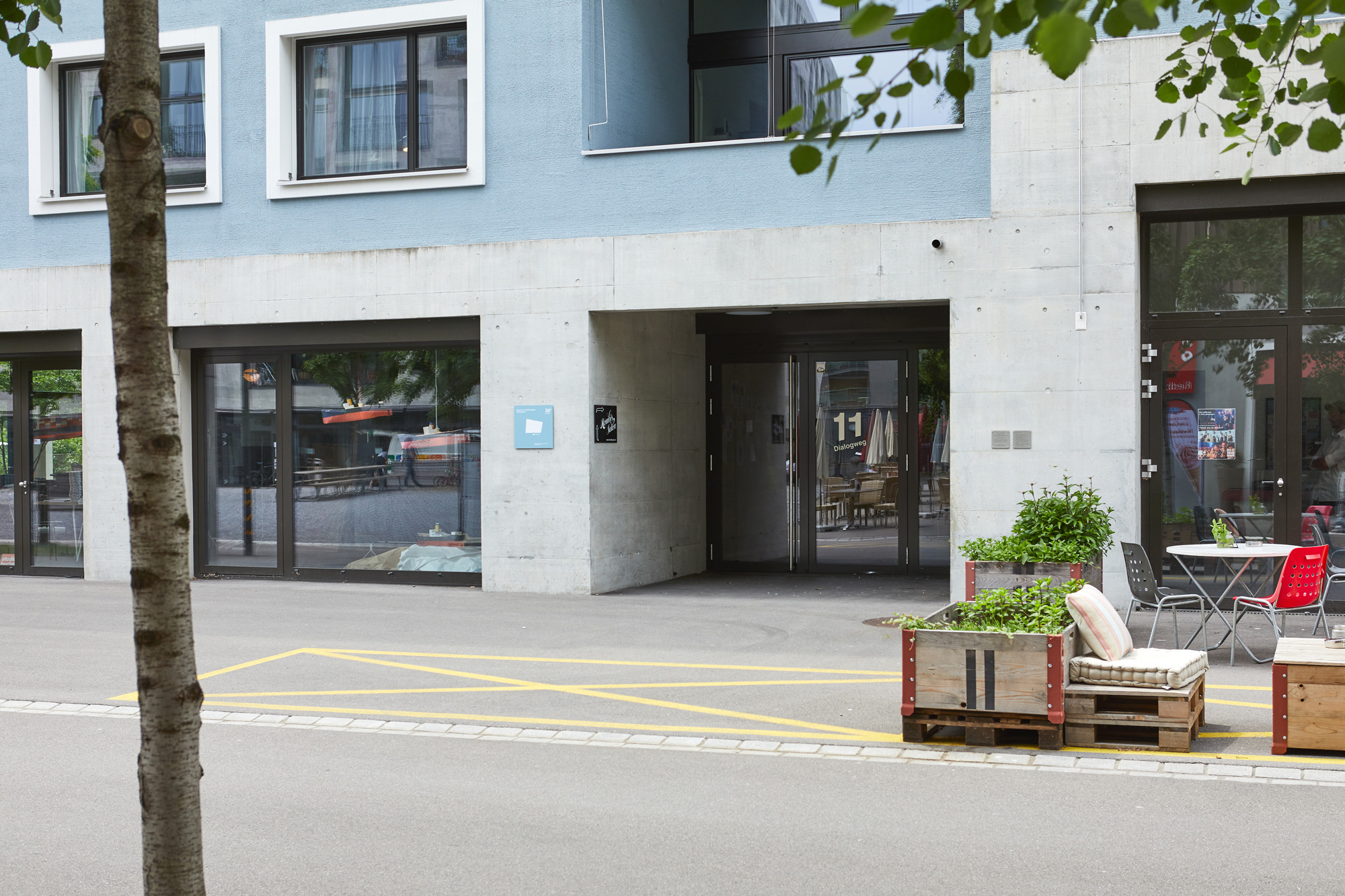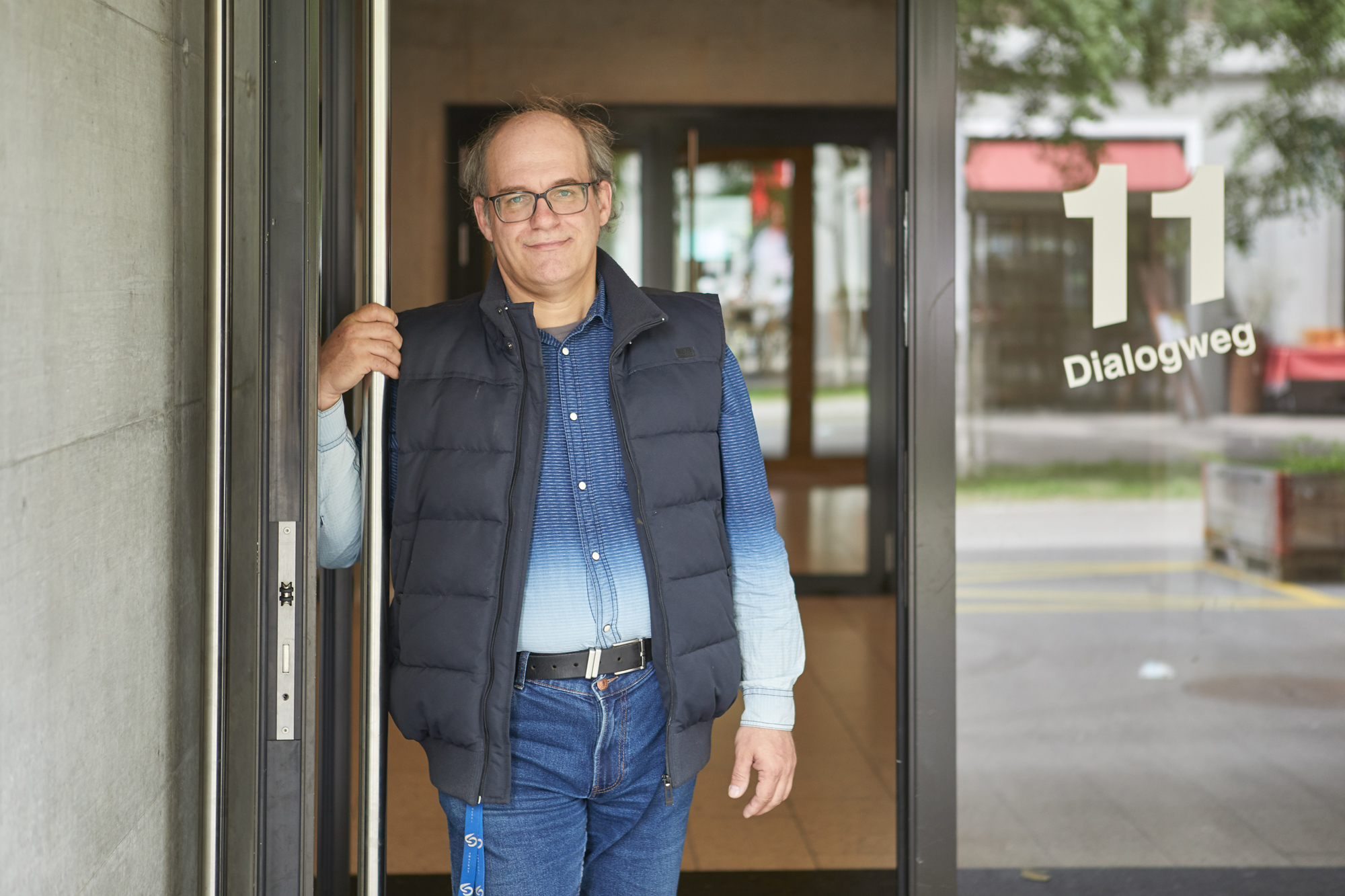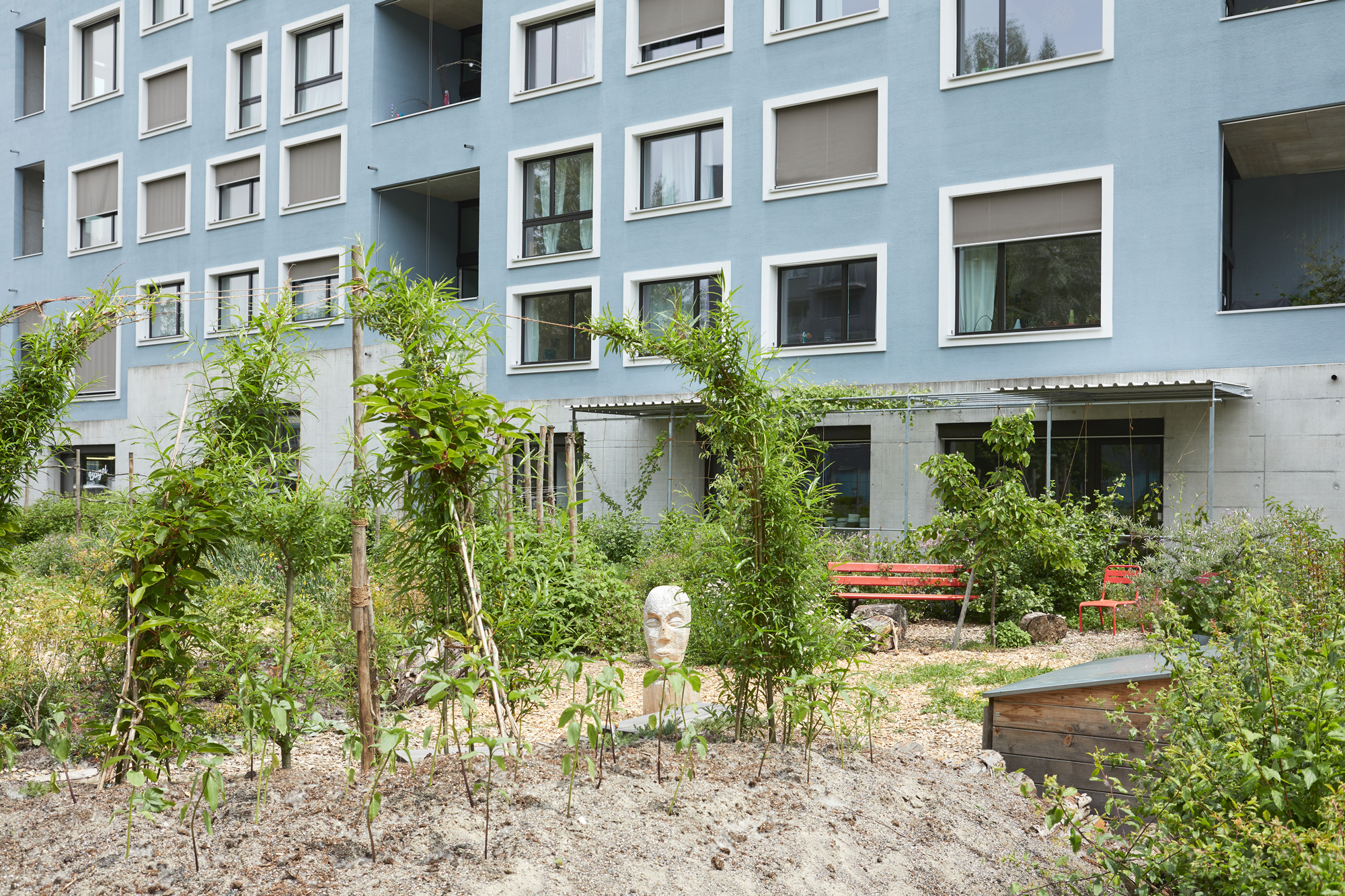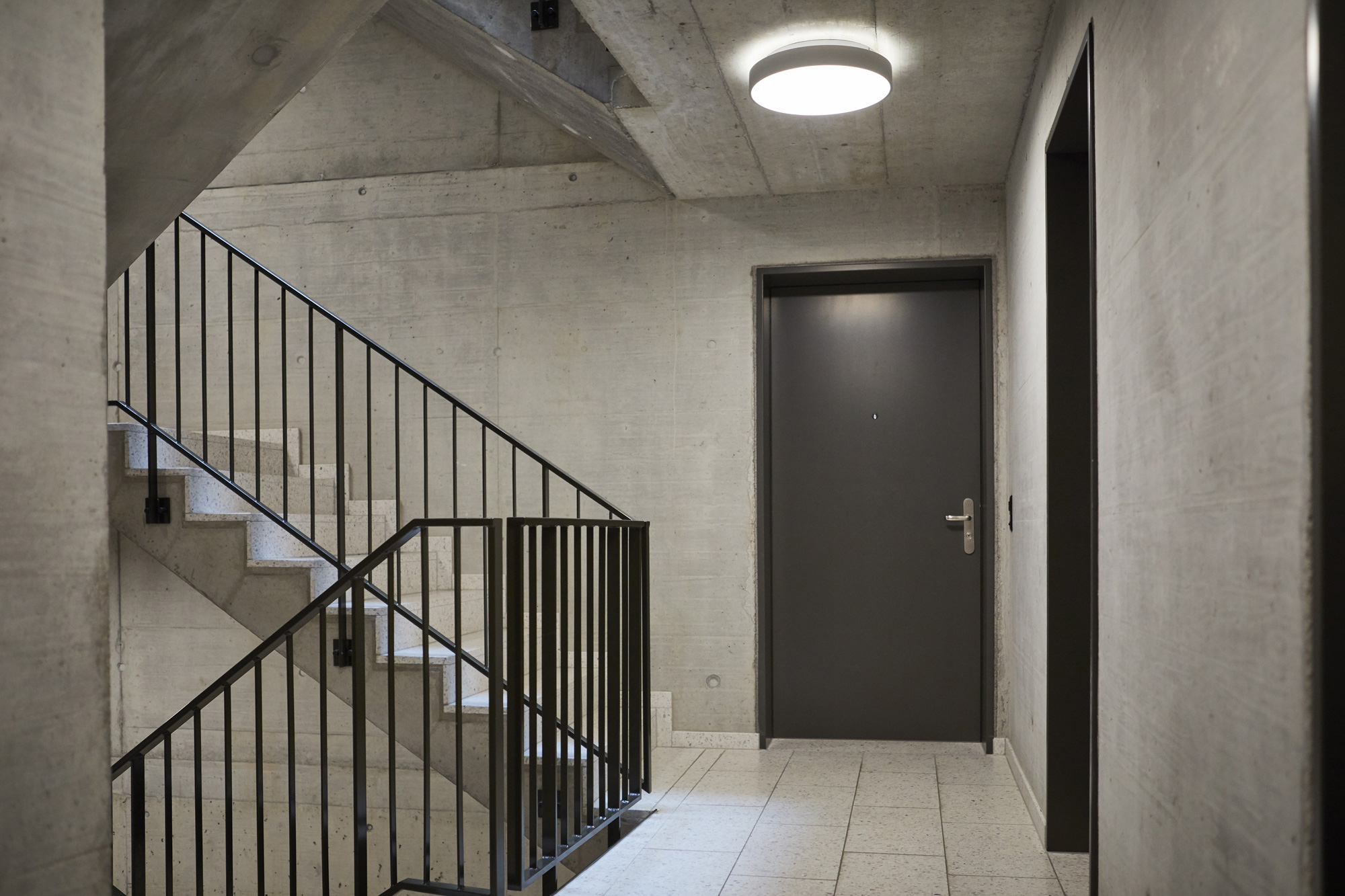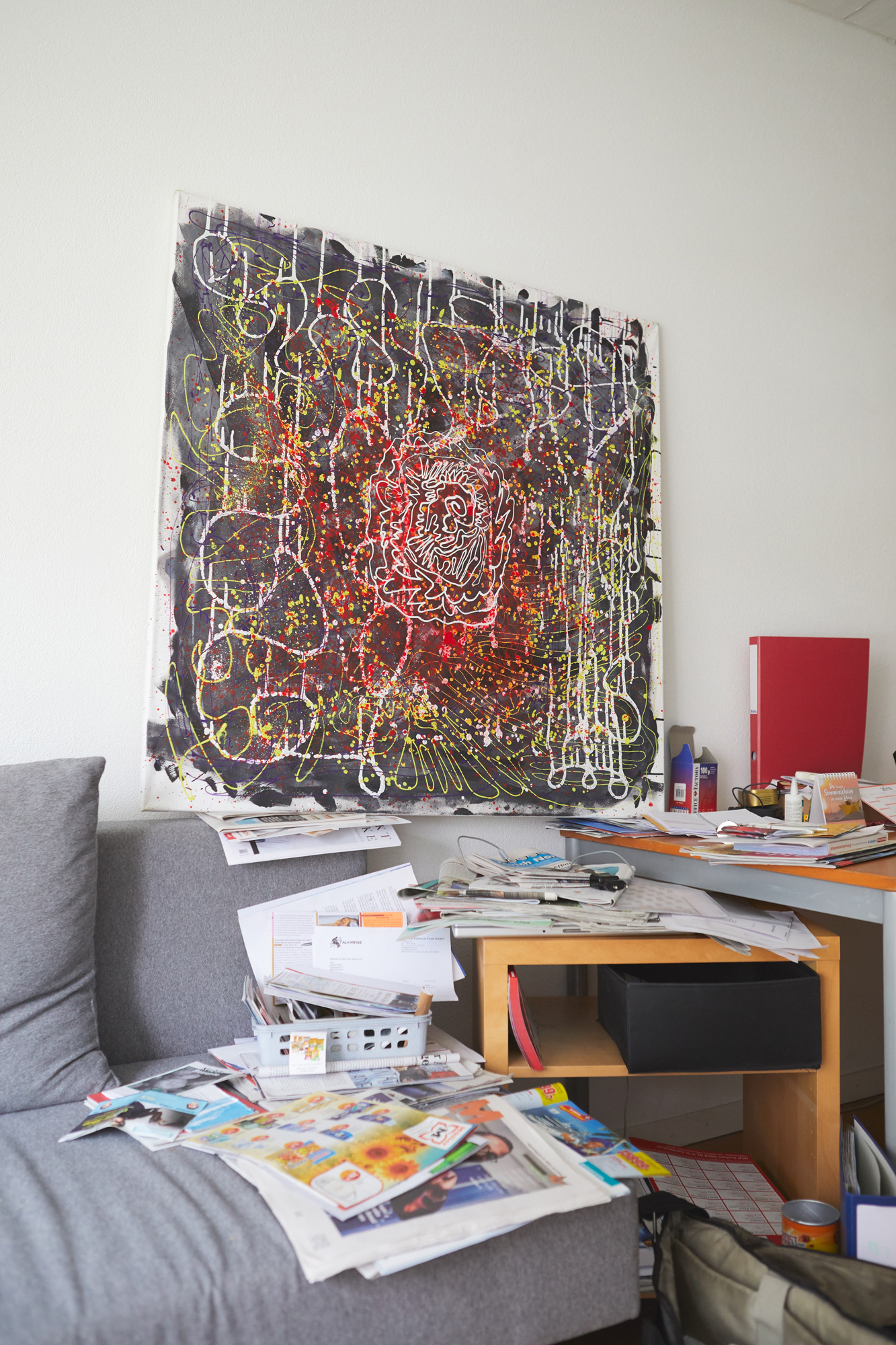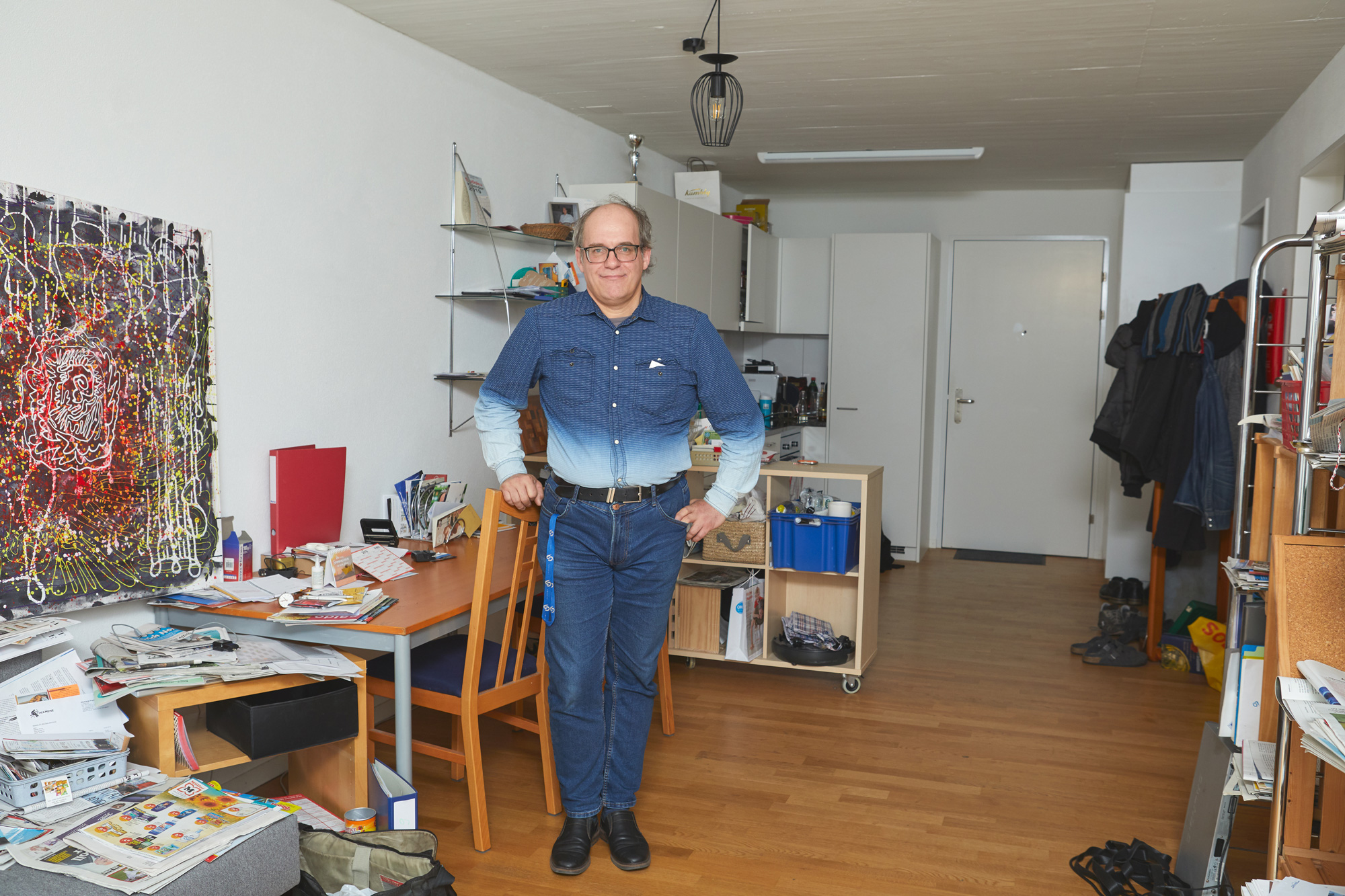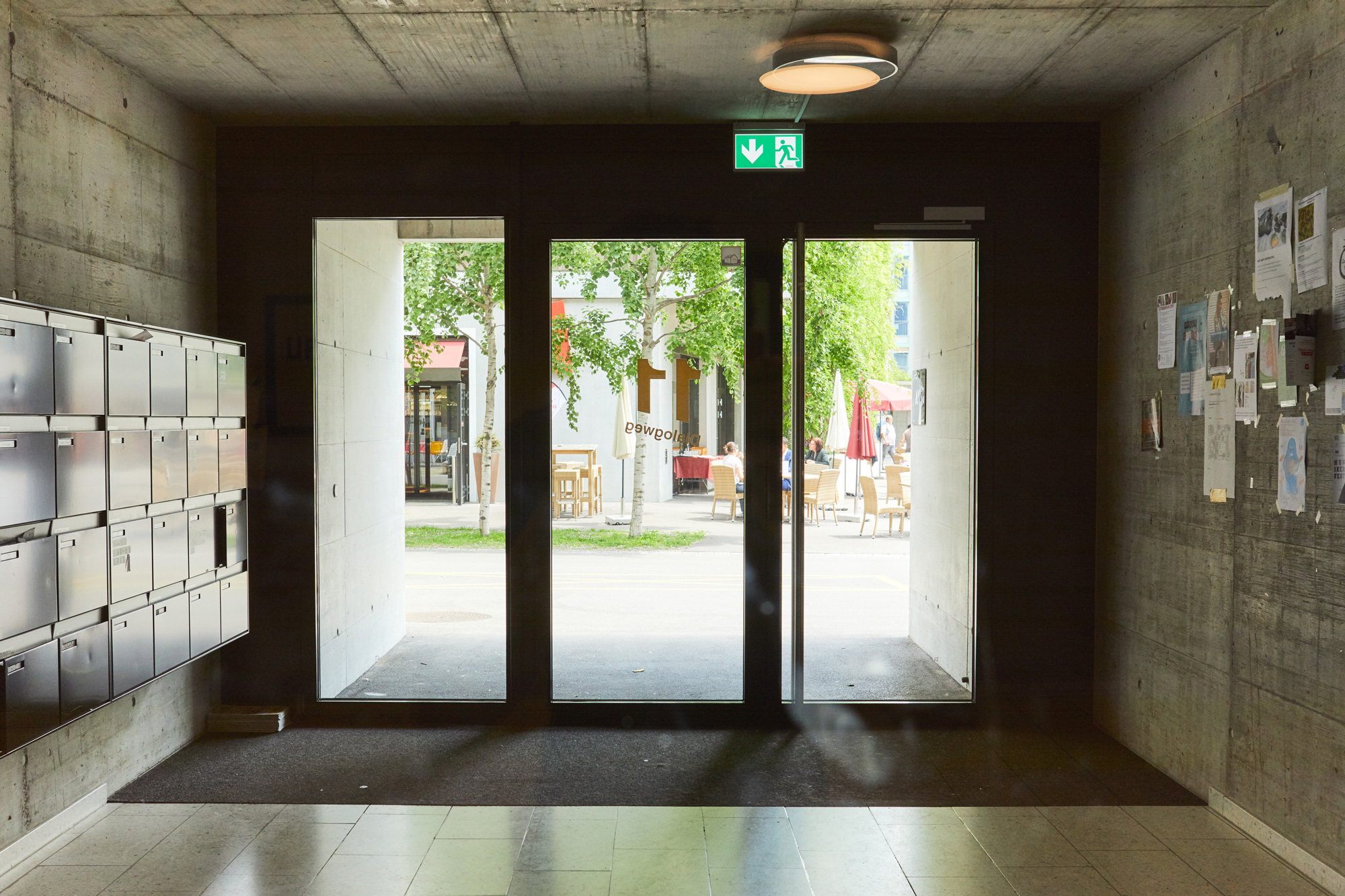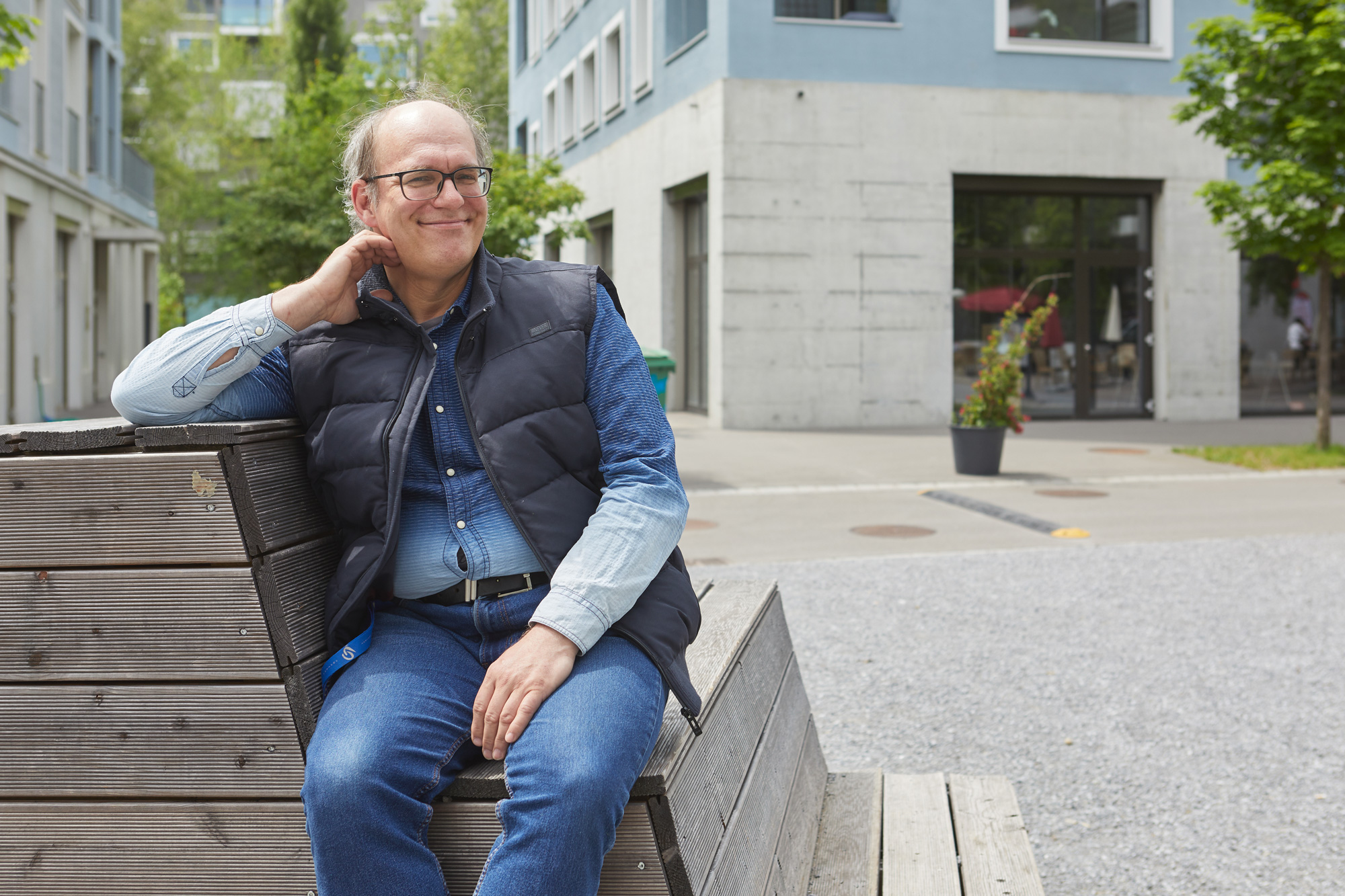"Every individual is of equal worth"
Giulia Bernardi • 06.06.2019
What does it mean to have and live with a disability? And what challenges and prejudices does it involve? Daniel Stutz has had cognitive impairment since childhood. The trained carpenter has been living at Hunziker Areal in Zurich for almost a year, an inclusive housing project that promotes encounters between people from all generations and different experiences of life. The 52-year-old tells us of his everyday life and what it is like living on the site.
“Sorry for being late,” a voice in the stairwell sounds as I arrive in front of the apartment door. “I’m usually on time!” Says Daniel Stutz as he rushes past me to unlock the door. It makes a nice change, because it’s usually me who is the one who is running a bit late. After a friendly handshake, we find ourselves in a modern two-bedroom apartment overlooking the former factory premises of the Hunziker concrete factory.
There is not much left of the previous industry. Only the imposing facades of insulating concrete remain as reminders of a previous era, spreading over an area of 41,000 square meters, which in recent years, has developed into a lively neighbourhood. Completed in 2015, the housing development project was commissioned by the more than housing building cooperative and has since then offered residential and commercial space for around 1,300 people from all generations and backgrounds. Common rooms and its participatory format, including neighbourhood groups, enables residents to actively co-operate.
The Züriwerk Foundation, which is committed to individuals with cognitive impairments, is part of the concept with 40 apartments and 30 studio spaces. “We try to find the right apartment for each person,” says Stefan Sieber, Head of Outdoor Living. However, this is not always easy, because apart from the residents’ requests, we also have to pay attention to the requirements of the grant-awarding authorities: In addition to donations, Züriwerk is financed by contributions from cantonal social insurance. The Foundation’s service is aimed at enabling individuals with predominantly cognitive impairments to lead a self-determined and independent life as far as possible. Therefore, each person’s accompanying needs are taken into account and repeatedly re-evaluated, according to division manager Stefan Sieber.
Similar endeavours also take place at the cantonal level. As part of a pilot project, the canton of Berne is no longer directing its services to institutions, as was previously the case, but to the individuals concerned. The entire concept is called subject financing and should allow individuals with a disability more freedom in the choice of their care.
Your own four walls
Daniel Stutz has been living at Hunziker Areal since last summer. He has furnished his apartment simply and with loving care: Next to his window is a small sofa lit by springtime sunbeams, books and loose leaves of paper piled up on the armrests, a self-painted picture leaning against the wall. “I’ve assembled most of the furniture myself. I learned that during my training as a carpenter.”
Prior to moving to the area, Daniel Stutz spent nine years in a supervised residential community in Seebach. “The apartment was not as comfortable as than the one I have now, and life in shared accommodation did not suit me that much. My roommate and I just had different ideas,” he recalls. “Besides, I’m in my early 50s and I want more space for myself. This is why I am enjoying having my own four walls all the more.”
But the search for his own home has not been easy for Daniel Stutz. He had been searching for his own apartment for about five years, unfortunately without success. “I do not know why I couldn’t find anything. I also applied to the city for a low-cost apartment, but nothing came of that.” Through working at Züriwerk he became aware of this housing offer, which finally enabled him to have his current home at Hunziker Areal.
Learning by Doing
Daniel Stutz has been working at Züriwerk for four years now. He mainly carries out housekeeping or recycling work for four days a week. The 52-year-old finds the work simple, but physically demanding. After training as a carpenter, he tried several times to gain a foothold in the open labour market, but was unable to find a job. “I think that prejudice needs to be reduced and we need more companies who are willing to give people with disabilities a chance. After all, every disability is different.”
On his day off, he often visits his mother. “She is single and happy for help with shopping or at home. But I also want to be more creative, to do things with my hands. I’ve already tried my hand at pottery.” Once a week, Daniel Stutz meets with his carer. “We chat, I can ask questions, if I have any, or say if I require any more care. At the moment I’m fine on my own. In any case, a lot of it is just learning by doing.” His cognitive impairment was triggered by a series of epileptic seizures during his childhood. “The strong medication has affected my concentration. At that time I had to attend a special school, as integrative schools did not yet exist.”
“The” impairment does not exist
“I feel very much at home in this neighbourhood. It’s so lively, I like that. Sometimes I hear my neighbour playing the piano – so it’s like having my own private concert,” says Daniel Stutz, grinning. He meets other residents in the laundry room or by the mail boxes. “But if you wanted you could also meet more people, for example in the neighbourhood groups. One has just been set up that wants to set up a Foxtrail in the area. I think I might find it exciting to join in.”
The location at Hunziker Areal has many advantages, says Stefan Sieber. “Here those with impairments are part of the whole and do not even stand out. There are many things on offer that you can take part in, which is very much appreciated.”
In recent years, the perception of what is an impairment and how it manifests has changed. “It is more likely that a disability is an attribution, rather than a condition. Public transport is almost barrier-free, so that those with disabilities may no longer notice.” In addition, advances in medicine and rehabilitation mean that weaknesses can be better compensated for, so that social images of impairments have changed. Efforts are also being made at a political level to normalise the way in which individuals with disabilities are treated. An example of this is the Disability Equality Act, which has been in force since 2004, and the UN Convention on the Rights of Persons with Disabilities, which was ratified in 2014.
However, because it is not obvious, individuals with cognitive impairment often do not have it easy. “I often get the impression that disabilities, which are visible, receive more support,” says Stefan Sieber. “The fact that tram stations have to be wheelchair accessible quickly comes to mind. For a person with cognitive disabilities, however, the barriers that they encounter can not be seen.” Therefore, there is often prejudice against individuals who are cognitively impaired. “For example, if someone is a bit slow at the cash register, their behaviour is often labelled as “funny” or “cumbersome” and not associated with an impairment.”
“Every individual is of equal worth”
“If you ask me, I do not mind talking about my disability. However, I’m rarely asked,” says Daniel Stutz. “I think people prefer to avoid the topic. We need to raise the fact that those with impairments are not annoying, but can carry out meaningful work. Even though they are different, they are still human. And everyone is of equal value,” says Daniel Stutz and looking thoughtful, but at the same time continuing with an infectious zest for life in his voice: “But that’s a massive topic that we could talk about forever. By the way: Would you like something to drink? With all the talking I completely forgot to ask!”, he says and laughs.
Photography: Lucas Ziegler
